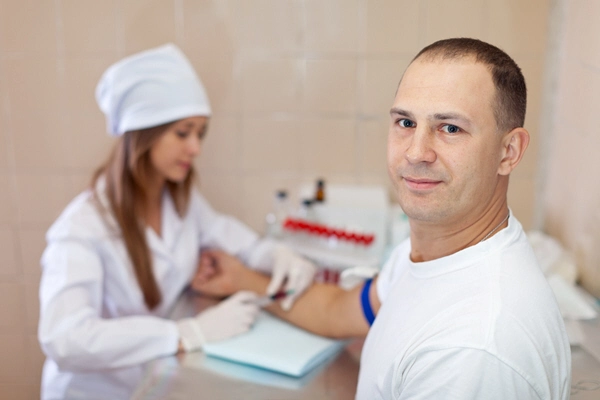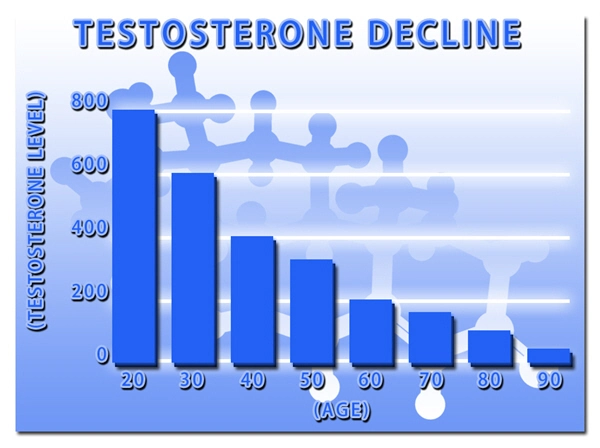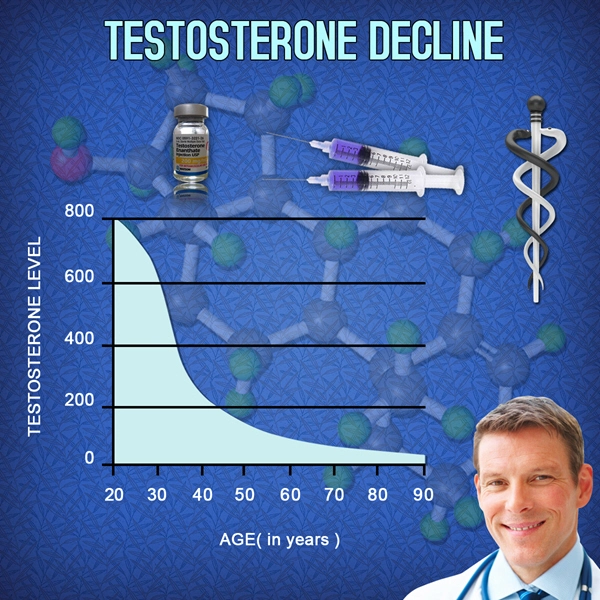Introduction
Testosterone deficiency syndrome (TDS), also known as hypogonadism, is a condition that affects a significant number of American men, particularly as they age. This syndrome is characterized by low levels of testosterone, which can lead to a variety of health issues, including those related to urinary health. Understanding the connection between TDS and urinary health is crucial for improving the quality of life for affected men.
The Prevalence of Testosterone Deficiency Syndrome
In the United States, TDS is increasingly recognized as a common health concern among men. Studies suggest that approximately 2-6% of men under the age of 40 and up to 30% of men over 70 may experience symptoms of TDS. The condition can be caused by a variety of factors, including aging, obesity, chronic diseases, and genetic predispositions. As the population ages, the prevalence of TDS is expected to rise, making it a significant public health issue.
Symptoms and Diagnosis of TDS
Men with TDS may experience a range of symptoms, including decreased libido, erectile dysfunction, fatigue, depression, and reduced muscle mass. Importantly, urinary symptoms such as increased frequency, urgency, and nocturia (waking up at night to urinate) can also be indicative of TDS. Diagnosing TDS involves a thorough medical history, physical examination, and blood tests to measure testosterone levels. It is essential for men experiencing these symptoms to consult with a healthcare provider for proper evaluation and management.
The Impact of TDS on Urinary Health
The relationship between TDS and urinary health is multifaceted. Low testosterone levels can contribute to the development of benign prostatic hyperplasia (BPH), a condition characterized by an enlarged prostate that can obstruct urine flow. Additionally, TDS may affect bladder function and increase the risk of urinary tract infections. Research has shown that testosterone replacement therapy (TRT) can improve urinary symptoms in men with TDS, highlighting the importance of addressing hormonal imbalances to maintain urinary health.
Testosterone Replacement Therapy and Urinary Health
TRT is a common treatment for men with TDS and can have beneficial effects on urinary health. By restoring testosterone levels to normal ranges, TRT can help alleviate symptoms of BPH and improve overall urinary function. However, it is crucial for men considering TRT to work closely with their healthcare providers to monitor for potential side effects and ensure the therapy is appropriate for their specific health needs.
Lifestyle Interventions for Managing TDS and Urinary Health
In addition to medical treatments, lifestyle interventions play a vital role in managing TDS and improving urinary health. Regular exercise, a balanced diet, and maintaining a healthy weight can help boost testosterone levels and reduce the risk of urinary issues. Men should also avoid smoking and limit alcohol consumption, as these habits can exacerbate both TDS and urinary problems.
The Importance of Regular Health Screenings
Regular health screenings are essential for early detection and management of TDS and related urinary health issues. Men should discuss their symptoms and risk factors with their healthcare providers and undergo routine blood tests to monitor testosterone levels. Early intervention can prevent the progression of TDS and its impact on urinary health, leading to better overall health outcomes.
Conclusion
Testosterone deficiency syndrome is a prevalent condition among American men that can significantly affect urinary health. By understanding the link between TDS and urinary symptoms, men can take proactive steps to manage their health through medical treatments, lifestyle changes, and regular screenings. Addressing TDS not only improves urinary function but also enhances overall quality of life, making it a critical focus for men's health in the United States.

- Understanding and Managing Testosterone Deficiency Syndrome in American Men [Last Updated On: February 26th, 2025] [Originally Added On: February 26th, 2025]
- Testosterone Deficiency Syndrome: Hormone Therapy Benefits and Considerations for American Males [Last Updated On: March 18th, 2025] [Originally Added On: March 18th, 2025]
- Environmental Toxins Linked to Testosterone Deficiency in American Males: Impacts and Mitigation [Last Updated On: March 18th, 2025] [Originally Added On: March 18th, 2025]
- Stress and Testosterone Deficiency in American Males: Causes, Symptoms, and Management [Last Updated On: March 19th, 2025] [Originally Added On: March 19th, 2025]
- Alcohol's Impact on Testosterone Levels and TDS in American Males: A Comprehensive Analysis [Last Updated On: March 19th, 2025] [Originally Added On: March 19th, 2025]
- Smoking's Impact on Testosterone Deficiency Syndrome in American Males: A Comprehensive Analysis [Last Updated On: March 20th, 2025] [Originally Added On: March 20th, 2025]
- Testosterone Levels: Importance of Regular Check-ups for American Males [Last Updated On: March 20th, 2025] [Originally Added On: March 20th, 2025]
- Testosterone Deficiency in American Men: Impacts on Mood and Holistic Management Strategies [Last Updated On: March 21st, 2025] [Originally Added On: March 21st, 2025]
- Testosterone Deficiency Syndrome: Impact on Muscle Mass and Management Strategies for American Men [Last Updated On: March 21st, 2025] [Originally Added On: March 21st, 2025]
- Testosterone Deficiency Syndrome: Impacts and Management in American Men's Prostate Health [Last Updated On: March 21st, 2025] [Originally Added On: March 21st, 2025]
- Testosterone Deficiency and Sleep Apnea: Impacts and Management for American Males [Last Updated On: March 22nd, 2025] [Originally Added On: March 22nd, 2025]
- Testosterone Deficiency Syndrome: Impacts on Joint Health and Management Strategies [Last Updated On: March 22nd, 2025] [Originally Added On: March 22nd, 2025]
- Understanding and Managing Testosterone Deficiency Syndrome in American Men [Last Updated On: March 22nd, 2025] [Originally Added On: March 22nd, 2025]
- Testosterone Deficiency Syndrome: Impacts on Libido and Mental Health in American Men [Last Updated On: March 22nd, 2025] [Originally Added On: March 22nd, 2025]
- Understanding and Managing Testosterone Deficiency in American Men: Impacts and Solutions [Last Updated On: March 23rd, 2025] [Originally Added On: March 23rd, 2025]
- Testosterone Deficiency and Depression: Impact and Management in American Men [Last Updated On: March 23rd, 2025] [Originally Added On: March 23rd, 2025]
- Diet Soda Consumption Linked to Lower Testosterone Levels in American Men [Last Updated On: March 23rd, 2025] [Originally Added On: March 23rd, 2025]
- Vitamin D's Role in Managing Testosterone Deficiency in American Males [Last Updated On: March 23rd, 2025] [Originally Added On: March 23rd, 2025]
- Ashwagandha: A Natural Remedy for Testosterone Deficiency in American Men [Last Updated On: March 23rd, 2025] [Originally Added On: March 23rd, 2025]
- Testosterone Deficiency Syndrome: Impacts and Management of Skin Health in American Men [Last Updated On: March 23rd, 2025] [Originally Added On: March 23rd, 2025]
- Omega-3 Fatty Acids: A Potential Aid in Managing Testosterone Deficiency in American Males [Last Updated On: March 24th, 2025] [Originally Added On: March 24th, 2025]
- Testosterone Deficiency in American Men: Impacts on Vision and Eye Health [Last Updated On: March 24th, 2025] [Originally Added On: March 24th, 2025]
- Testosterone Deficiency in American Men: Impacts and Management of Hair Loss [Last Updated On: March 24th, 2025] [Originally Added On: March 24th, 2025]
- Chronic Illness and Testosterone Deficiency Syndrome in American Males: Impacts and Management [Last Updated On: March 24th, 2025] [Originally Added On: March 24th, 2025]
- Testosterone Deficiency Syndrome: Impacts on Immune Function and Management Strategies [Last Updated On: March 24th, 2025] [Originally Added On: March 24th, 2025]
- Soy Consumption and Testosterone Levels in American Males with TDS: A Comprehensive Analysis [Last Updated On: March 24th, 2025] [Originally Added On: March 24th, 2025]
- Testosterone Deficiency in American Men: Impacts on Cognitive Function and Mental Health [Last Updated On: March 25th, 2025] [Originally Added On: March 25th, 2025]
- Zinc's Crucial Role in Managing Testosterone Deficiency in American Men [Last Updated On: March 25th, 2025] [Originally Added On: March 25th, 2025]
- Testosterone Deficiency Syndrome: Impacts on Liver Health and Management Strategies [Last Updated On: March 25th, 2025] [Originally Added On: March 25th, 2025]
- Blue Light Exposure and Its Impact on Testosterone Levels in American Men with TDS [Last Updated On: March 25th, 2025] [Originally Added On: March 25th, 2025]
- Weight Training Benefits for Men with Testosterone Deficiency Syndrome [Last Updated On: March 25th, 2025] [Originally Added On: March 25th, 2025]
- Testosterone Deficiency Syndrome: Impacts and Management for American Men's Kidney Health [Last Updated On: March 26th, 2025] [Originally Added On: March 26th, 2025]
- Testosterone Deficiency and Pancreatic Health: Critical Insights for American Men [Last Updated On: March 26th, 2025] [Originally Added On: March 26th, 2025]
- Magnesium's Role in Managing Testosterone Deficiency Syndrome in American Males [Last Updated On: March 26th, 2025] [Originally Added On: March 26th, 2025]
- Air Pollution's Impact on Testosterone Levels and TDS in American Males [Last Updated On: March 26th, 2025] [Originally Added On: March 26th, 2025]
- Testosterone Deficiency and Anemia: Critical Health Concerns for American Males [Last Updated On: March 27th, 2025] [Originally Added On: March 27th, 2025]
- Chronic Stress Impact on Testosterone Levels and TDS in American Males [Last Updated On: March 27th, 2025] [Originally Added On: March 27th, 2025]
- Testosterone Deficiency Syndrome: Impacts on Body Composition in American Males [Last Updated On: March 27th, 2025] [Originally Added On: March 27th, 2025]
- Testosterone Deficiency Syndrome: Impacts and Management in American Male Athletes [Last Updated On: March 27th, 2025] [Originally Added On: March 27th, 2025]
- High-Fat Diets and Testosterone Levels: Impact on American Males with TDS [Last Updated On: March 27th, 2025] [Originally Added On: March 27th, 2025]
- Pesticide Exposure Linked to Testosterone Deficiency in American Men: Risks and Prevention [Last Updated On: March 27th, 2025] [Originally Added On: March 27th, 2025]
- Shift Work's Impact on Testosterone and TDS Risk in American Males [Last Updated On: March 27th, 2025] [Originally Added On: March 27th, 2025]
- Testosterone Deficiency Syndrome: Impacts on Hearing Health in American Males [Last Updated On: March 27th, 2025] [Originally Added On: March 27th, 2025]
- Testosterone Deficiency Linked to Increased Risk of Periodontal Disease in American Males [Last Updated On: March 27th, 2025] [Originally Added On: March 27th, 2025]
- Testosterone Deficiency in American Males: Impacts on Memory and Cognitive Health [Last Updated On: March 27th, 2025] [Originally Added On: March 27th, 2025]
- Boron's Role in Managing Testosterone Deficiency Syndrome in American Males [Last Updated On: March 28th, 2025] [Originally Added On: March 28th, 2025]
- EMFs and Testosterone Levels in American Males with TDS: Exploring the Link [Last Updated On: March 28th, 2025] [Originally Added On: March 28th, 2025]
- Plasticizers' Impact on Testosterone Levels and TDS in American Men [Last Updated On: March 28th, 2025] [Originally Added On: March 28th, 2025]
- Testosterone Deficiency Linked to Gallbladder Disease: Insights for American Males [Last Updated On: March 29th, 2025] [Originally Added On: March 29th, 2025]
- Testosterone Deficiency and Thyroid Function: A Comprehensive Guide for American Males [Last Updated On: March 29th, 2025] [Originally Added On: March 29th, 2025]
- Heavy Metal Exposure Linked to Testosterone Decline in American Men [Last Updated On: March 30th, 2025] [Originally Added On: March 30th, 2025]
- Fenugreek: A Promising Natural Remedy for Testosterone Deficiency Syndrome in Men [Last Updated On: March 30th, 2025] [Originally Added On: March 30th, 2025]
- Noise Pollution's Impact on Testosterone Levels in American Males: A Comprehensive Analysis [Last Updated On: April 1st, 2025] [Originally Added On: April 1st, 2025]
- Tribulus Terrestris: A Natural Approach to Managing Testosterone Deficiency in American Men [Last Updated On: April 2nd, 2025] [Originally Added On: April 2nd, 2025]
- Testosterone Deficiency Syndrome: Symptoms, Adrenal Health, and Treatment for American Males [Last Updated On: April 3rd, 2025] [Originally Added On: April 3rd, 2025]
- Testosterone Deficiency Syndrome: Impact, Diagnosis, and Treatment in American Men [Last Updated On: April 5th, 2025] [Originally Added On: April 5th, 2025]
- Testosterone Deficiency and Parathyroid Health: Impacts on American Males' Well-being [Last Updated On: April 7th, 2025] [Originally Added On: April 7th, 2025]
- Pineal Gland's Role in Testosterone Deficiency Syndrome Among American Males [Last Updated On: April 9th, 2025] [Originally Added On: April 9th, 2025]
- Testosterone Deficiency Syndrome: Hypothalamic Impact and Management in American Men [Last Updated On: April 9th, 2025] [Originally Added On: April 9th, 2025]
- DHEA Supplementation: A Promising Approach to Combat Testosterone Deficiency in American Males [Last Updated On: April 9th, 2025] [Originally Added On: April 9th, 2025]
- Fluoride Exposure and Testosterone Levels: Implications for TDS in American Men [Last Updated On: April 10th, 2025] [Originally Added On: April 10th, 2025]
- Phthalates' Impact on Testosterone Levels in American Males: A Public Health Concern [Last Updated On: April 10th, 2025] [Originally Added On: April 10th, 2025]
- Testosterone Deficiency and Respiratory Health: Insights for American Males [Last Updated On: April 10th, 2025] [Originally Added On: April 10th, 2025]
- Ginseng's Potential in Managing Testosterone Deficiency in American Men: A Review [Last Updated On: April 11th, 2025] [Originally Added On: April 11th, 2025]
- PFCs and Testosterone Deficiency: Impacts on American Males' Hormonal Health [Last Updated On: April 11th, 2025] [Originally Added On: April 11th, 2025]
- Testosterone Deficiency Syndrome: Impacts on Gastrointestinal Health and Management Strategies [Last Updated On: April 12th, 2025] [Originally Added On: April 12th, 2025]
- Bisphenol A Exposure Linked to Reduced Testosterone in American Men [Last Updated On: April 13th, 2025] [Originally Added On: April 13th, 2025]



List of USA state clinics - click a flag below for blood testing clinics.
Word Count: 585



















































